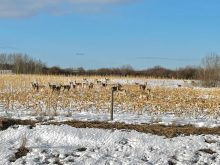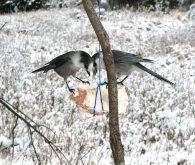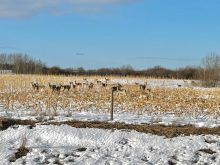I am on my third hunting dog and she is in the autumn of her hunting days.
After three decades with a dog joining me on a grouse walk or in a duck blind, a bird hunt without my four-footed pal just doesn’t seem right. It’s not just because a well-trained dog adds tremendously to the success of the hunt. A good dog is also the best of companions.
Why it matters: Training a hunting dog takes patience, understanding, time and dealing with some degree of failure. You can’t expect to get it all right and you will live with the results.
Read Also

Air, land and sea join forces as Manitoba launches Arctic trade corridor plans
Manitoba wants to take its Arctic trade routes to the big leagues. The Port of Churchill, CentrePort Canada and Winnipeg airport have all raised their hands to help it happen.
There is evidence that the shift from wolf to dog began over 30,000 years ago. What we would recognize as domesticated dogs are commonly found in archaeological digs throughout the world, with subjects dated well before the development of agriculture.
This suggests the process of domesticating the wolf ancestors of dogs occurred separately in many parts of the world. It helps explain the incredible diversity of dog breeds.
The first dogs may have functioned mainly as sentinels, alerting vulnerable humans to either two- or four-footed intruders, while the canines could cadge meals from the scraps of human settlement.
From that possible beginning, dogs became shepherds, hunting assistants and valued companions. Remains of dogs buried in like manner to humans have been found as far back as 15,000 years, pointing to a special relationship that plays out to this day.

In addition to physical differences between dogs and wolves, animal behaviourists have identified subtle behavioural differences in dogs that help reinforce their bonds with humans.
Dogs need us; they are finely tuned to our actions and can be trained to carry out invaluable tasks. Perhaps most of all, we appreciate the eager-to-please, tail-wagging pal that loves to curl up at our feet.
The range of dogs bred to help people hunt is almost limitless. In these parts, most hunters either use retrievers, like Labrador or Chesapeake Bay retrievers, flushing dogs, which include a range of spaniels, or pointing dogs like Irish setters or German Wirehairs.
My history with hunting dogs
My family only had a house dog while I was growing up. Later, my father-in-law was one of the best springer spaniel trainers in the country. I came to learn he was also the most passionate sharp-tailed grouse hunter I had ever met.
After several grouse hunting trips with him and his celebrated springers, my wife and I took the plunge. We bought an English cocker spaniel pup, a smaller version of a springer spaniel. The newly dubbed ‘Patch’ seemed to be a good fit with city life and three kids who loved having a puppy.

Patch’s training program turned out well, a feat due entirely to my father-in-law’s tutelage. He could see that Patch came from good hunting stock and made no bones about the fact that, if he became a hunting dud, it was because the trainer screwed up.
Accordingly, our sessions were mostly about training the intimidated, novice trainer.
Even though Patch was small – just over 15 kilograms while wet – he was built with hard muscle and determination. We used him to hunt grouse and waterfowl and he kept getting better as he racked up experience.
My son and I learned that if we got tired of scanning the skies, we could sit in our duck blind and watch Patch, who quivered with excitement when ducks came into view. The day this little runt of the litter managed to retrieve my son’s first Canada goose is a milestone in family hunting lore.
Hunting the uplands with Patch was pure pleasure.
At midday, sharp-tailed grouse often hang out in the shade of small, dense willow thickets.
Pre-dog, the hunter in our party who drew the short straw would have to crash through the tangles to try to get a bird to flush.
With Patch, the routine was simple. He would sit expectantly at one end of a thicket while we moseyed over to the other. We would then give him the command to hunt. He could run under the tangles and, as dog people would say, Patch had “a good nose.” If he scented a bird, he would track it and get it to flush. And, if we shot well, Patch retrieved the bird for us.
That kind of performance gets one a little spoiled.
When Patch got too old to hunt, we bought a springer spaniel named Neeso, the Cree word for “two”. When his hunting days ended, Niska, the Cree word for “goose”, joined the family.

She’s nine years old this fall, but I hope she can join me for a couple more seasons, after which her main job will be to curl up in her cozy little corner of the kitchen.
The bigger picture
When you bring a dog into the mix, hunting is more than just time in the field with a gun in hand.
When my son was young, I would often load training gear and the dog into the car and then say to my son, “Time to go hunting.”
In the strictest sense, it was just a dog-training session, but it was also an essential part of our hunting calendar and helped make hunting a multi-faceted experience.
Now in his 30s and living two provinces away, my son was recently home for some holiday time at the family cottage. I asked him how he saw our dogs shaping his hunting experiences.
“Of course, I loved having a dog in the house year-round, but our hunting dogs helped me to appreciate the entirety of the hunt. Dog training, scouting, getting landowner permission and building blinds are all part of the hunt,” he said.
Our dogs’ successes were often the most important memories of past hunts, eclipsing any discussion of how many birds were brought home.
“There was a hunt, Dad, where I think you shot three ruffed grouse, but I’ll always remember the great retrieve Patch made on a bird that we weren’t even sure you had hit. Patch took off in the woods after you shot and, five minutes later, came back with the bird,” he recalled.
Basic questions
The hard truth about hunting dogs is that it takes time and discipline to train a dog that hunts reasonably well. Folks should think hard about owning and training a hunting dog before taking the plunge.
Are you a dog lover? The training process is challenging, and things will not always go as planned. If you don’t start with an inherent love for your animal, no one will have fun.
Are your expectations realistic? Dogs will not magically come up with birds.

First, the birds have to be where the dog is hunting. Second, the conditions must be conducive for the dog’s instincts to come to play and produce results. For example, some days the scenting conditions are just lousy, which makes things tough on the dog.
Do you know an experienced hunting dog owner and trainer? Having a mentor improves your odds, though I know folks who have done a good job learning from books and good YouTube videos.
Are you willing to invest time and money to find a reputable dog breeder? Many breeders sell Labrador retriever or springer spaniel pups, but were those pups bred for strong hunting instincts?
If this sounds like a bit of hunting-dog-owner snobbery, I once watched a guy try to train a springer spaniel that came from a show dog genetic line. It was evident that the hunting and scenting instincts had pretty much disappeared.
If a dog breeder says their dogs are good for hunting, ask more questions. For example, have the pup’s parents or grandparents competed in hunting trials or, better yet, been successful?
Are you willing to accept that the dog’s abilities may not match your expectations? Dogs will sometimes act in ways that try their owners. That’s just part of the game, especially if your training program was less than stellar.
My current dog does a poor job on longer water retrieves. I think it is because she doesn’t like swimming all that much. Looking back, that trait was evident early in her training, but I didn’t notice until it was too late to remedy. So, I live with it and remind myself that she is a crackerjack retriever on land.
Like any pet, hunting dogs have their own personalities to which you must adjust. Niska is a sweetheart that just seems to radiate happiness and is eager to please, but it sometimes gets expressed in odd ways. When she swims out to retrieve a duck, or even a thrown stick, she wants it so badly that she lets out full-throated howls of anguish until the quarry is finally in her mouth.
Since this can be heard half a kilometre away on a calm morning, other hunters have asked me what nasty things I’ve been doing to her, and it isn’t always easy to get them to believe the truth.

Is a hunting dog for you?
Take some time to answer that question before you take the plunge.
Perhaps the most important questions revolve around how much of a dog-lover you are, whether you have time to commit and whether you can temper your expectations as to what dogs can and can’t do.
But when it all works out reasonably well, the result is a new dimension to your hunting experience that changes the way you hunt for the better.
The memories you bring back from the field will be there to recount for months, years and decades.


















